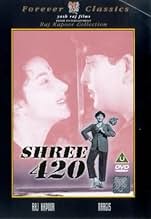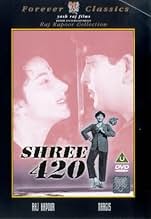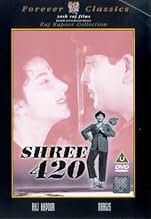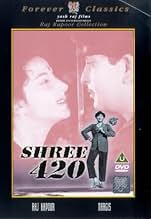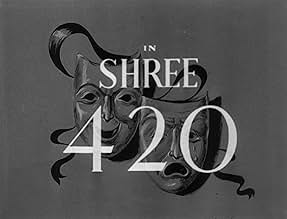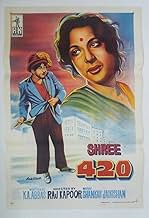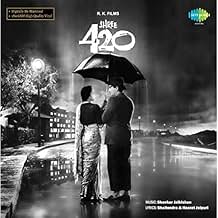Shree 420
- 1955
- 2h 48m
IMDb RATING
7.9/10
3.2K
YOUR RATING
When a young man from a small town decides to make it big in a city, he faces several challenges.When a young man from a small town decides to make it big in a city, he faces several challenges.When a young man from a small town decides to make it big in a city, he faces several challenges.
- Awards
- 3 wins total
Featured reviews
"Shree 420" is a classic Bollywood film directed by Raj Kapoor and released in 1955. Starring Raj Kapoor himself, the movie revolves around the story of a young man named Raj who comes to the big city of Bombay (now Mumbai) with dreams of success and wealth. However, he soon realizes that the city is filled with corruption and deceit.
The film addresses various social issues prevalent at the time, such as the exploitation of the poor by the rich and the lure of quick money. Raj Kapoor's character, Raj, represents the common man who is easily swayed by materialistic desires but eventually learns the importance of honesty and integrity.
Composed by Shankar-Jaikishan, with lyrics by Shailendra and Hasrat Jaipuri, the songs, including the iconic "Mera Joota Hai Japani" and "Pyaar Hua Ikraar Hua," have become timeless classics and continue to be loved by audiences even today.
Raj Kapoor's performance in the film is stellar, showcasing his versatility as an actor. He effortlessly portrays the transformation of his character from an innocent and naive young man to someone who becomes disillusioned with the city's corruption. Nargis, who plays Vidya, Raj's love interest, delivers a memorable performance as well, bringing depth and emotion to her character.
The screenplay of "Shree 420" effectively captures the contrasting elements of hope and despair, humor and tragedy, and romance and social commentary. Raj Kapoor's direction ensures a balanced narrative that keeps the audience engaged throughout.
The film's cinematography, though dated by today's standards, was groundbreaking for its time. It beautifully captures the essence of Bombay, showcasing both its vibrant streets and the stark reality of its slums.
Overall, "Shree 420" is a classic Bollywood film that combines elements of romance, drama, and social commentary. It remains relevant even after several decades, as its themes of greed, corruption, and the struggle for a better life still resonate with audiences today. The movie's memorable performances, outstanding music, and Raj Kapoor's directorial vision make it a must-watch for any fan of Indian cinema or those interested in exploring the golden era of Bollywood.
The film addresses various social issues prevalent at the time, such as the exploitation of the poor by the rich and the lure of quick money. Raj Kapoor's character, Raj, represents the common man who is easily swayed by materialistic desires but eventually learns the importance of honesty and integrity.
Composed by Shankar-Jaikishan, with lyrics by Shailendra and Hasrat Jaipuri, the songs, including the iconic "Mera Joota Hai Japani" and "Pyaar Hua Ikraar Hua," have become timeless classics and continue to be loved by audiences even today.
Raj Kapoor's performance in the film is stellar, showcasing his versatility as an actor. He effortlessly portrays the transformation of his character from an innocent and naive young man to someone who becomes disillusioned with the city's corruption. Nargis, who plays Vidya, Raj's love interest, delivers a memorable performance as well, bringing depth and emotion to her character.
The screenplay of "Shree 420" effectively captures the contrasting elements of hope and despair, humor and tragedy, and romance and social commentary. Raj Kapoor's direction ensures a balanced narrative that keeps the audience engaged throughout.
The film's cinematography, though dated by today's standards, was groundbreaking for its time. It beautifully captures the essence of Bombay, showcasing both its vibrant streets and the stark reality of its slums.
Overall, "Shree 420" is a classic Bollywood film that combines elements of romance, drama, and social commentary. It remains relevant even after several decades, as its themes of greed, corruption, and the struggle for a better life still resonate with audiences today. The movie's memorable performances, outstanding music, and Raj Kapoor's directorial vision make it a must-watch for any fan of Indian cinema or those interested in exploring the golden era of Bollywood.
Based on some Internet research on the best of Bollywood, and on a lifelong crush on Raj Kapoor's brother Shashi, this was the first Bollywood movie I sought out at an Indian video store, and it completely blew me away. If you want to start to get to know the greatness of this cultural tradition, this is a good place to start, and I recommend watching it thirty times. It is still my favorite after some months of searching out Bollywood classics.
This movie provides a sublime pathway to love of Bollywood; for one thing the music is completely enchanting, beginning with the first song, sung by Raj Kapoor in his role as a university- educated ("B.A. passed") young country fellow garbed as a hobo on his way to Bombay--he sings his song of the road about "My shoes are Japanese, my trousers are British, my red hat is Russian, but my heart is Indian" --Mera juta hai Japani, etc. I do not speak Hindi and I have had to memorize it. I think some westerners may believe that the music of Bollywood movies will be a stumbling-block, but see if you still think that after you see this one. The songs are compelling and varied, the lyrics elaborate story elements, with the additional pleasure of being Indian or non-Western or whatever in their sentiments. Raj Kapoor's brilliant physicality and body language alone make the movie a joy.
It also provides the pleasures of screen romance with powerful chemistry (between Raj Kapoor and the great star Nargis, his real life inspiration and beloved), and of movement into the nightclub world of the rich and glamorous, and the opportunity to see the spectacularly handsome Raj change from a foolish-acting tramp/clown to a worldly charmer in a dinner jacket (even though this spells temporary trouble for the forgotten and virtuous Nargis).
~Virginia
This movie provides a sublime pathway to love of Bollywood; for one thing the music is completely enchanting, beginning with the first song, sung by Raj Kapoor in his role as a university- educated ("B.A. passed") young country fellow garbed as a hobo on his way to Bombay--he sings his song of the road about "My shoes are Japanese, my trousers are British, my red hat is Russian, but my heart is Indian" --Mera juta hai Japani, etc. I do not speak Hindi and I have had to memorize it. I think some westerners may believe that the music of Bollywood movies will be a stumbling-block, but see if you still think that after you see this one. The songs are compelling and varied, the lyrics elaborate story elements, with the additional pleasure of being Indian or non-Western or whatever in their sentiments. Raj Kapoor's brilliant physicality and body language alone make the movie a joy.
It also provides the pleasures of screen romance with powerful chemistry (between Raj Kapoor and the great star Nargis, his real life inspiration and beloved), and of movement into the nightclub world of the rich and glamorous, and the opportunity to see the spectacularly handsome Raj change from a foolish-acting tramp/clown to a worldly charmer in a dinner jacket (even though this spells temporary trouble for the forgotten and virtuous Nargis).
~Virginia
They rarely make them like this anymore in Bollywood. Meaningful cinema with a message but presented in a highly entertaining and artistically solid way with great song numbers and characters you care for. The cast is first rate, the direction inventive and technically the film is well done. Just two examples: The use of a ghost image to express Vidya's dilemma of having to condemn Raj while still loving him and the use of rain/smoke in the love song. The rain/smoke patterns are subtle but wonderful. The songs are among the most popular in Hindi cinema and not one is weak or a filler. A timeless classic that will never become outdated. Unfortunately there is no good DVD around and the film needs restoration (as practically all older Bollywood films (and most newer ones too)).
10rlelias
Shree 420 is a classic Bollywood "social" of the 1950s. Its romanticized populism deserves comparison to Frank Capra's films. As in Kapoor's earlier Awara, the hero is a Chaplinesque tramp, another vagabond (as in Awara). Poor but honest (and happy), he falls in love with Vidya (Nargis), but is soon tempted to partner with a fat millionaire who makes money through fraud. Raj soon becomes rich but just as quickly regrets his choice, with Vidya serving throughout as the voice of his conscience. Songs in Kapoor's films are classics, but beyond their quality, the way Kapoor uses them is an important aspect of his directorial technique. In a pivotal scene, Raj (Kapoor's hero shares his first name) staggers drunk from a nightclub to encounter a stone-faced Vidya outside her poor home. The narrative problem here is that she and the viewer must condemn Raj but, at the same time, the movie has to communicate that she still loves him. Kapoor deftly solves this problem by showing Vidya staring coldly while a white-robed specter of Vidya sings a love song to the departing Raj: two Vidyas, one who censures him, another who reaffirms her love for him. And a good song. Imagine how a Hollywood film might resolve this. How many words would it take? How many tears? Kapor allows the stone-faced Vidya to image our disapproval while the spectral Vidya's song reveals what is going on in her mind.
Shree 420 is a romantic, comedy and entertaining film. The story is about a man who tries to earn money illegally for caring the future family but fails to impress his lover and himself at the end. Here, Nargis played dual role (though there is only one character) of Raj's love partner and a guide for Raj who advice him not to indulge in illegal things to get money. Shree 420 teaches us the following significant lessons for life:
1. We should not go behind money. We may have greed for money but once we enter into its cycle, it becomes uninteresting.
2. The wealth gives dreams but leads us to a pit of tensions.
3. The people who are involved in fraud play lose their happiness forever.
4. All kinds of friendship is not trustable especially in financial case.
5. The wrong method for earning more will push one away from peaceful life which forms the central theme of the movie.
1. We should not go behind money. We may have greed for money but once we enter into its cycle, it becomes uninteresting.
2. The wealth gives dreams but leads us to a pit of tensions.
3. The people who are involved in fraud play lose their happiness forever.
4. All kinds of friendship is not trustable especially in financial case.
5. The wrong method for earning more will push one away from peaceful life which forms the central theme of the movie.
Did you know
- TriviaThe song of this movie "Mera joota hai jaapani" is heard being played in the opening seen of Dead pool (2016).
- ConnectionsFeatured in Patthar Ke Phool (1991)
- SoundtracksMera Joota Hai Japani, Yeh Patloon Englishtani
Music by Shankarsingh Raghuwanshi & Jaikishan Dayabhai Panchal
Performed by Mukesh
- How long is Shree 420?Powered by Alexa
Details
- Runtime
- 2h 48m(168 min)
- Color
- Aspect ratio
- 1.37 : 1
Contribute to this page
Suggest an edit or add missing content


